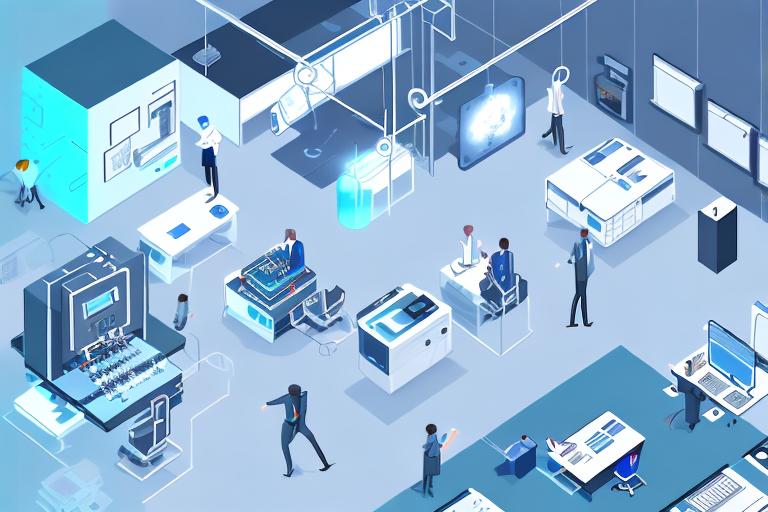Artificial intelligence (AI) has transformed various industries, and procurement is no exception. With its ability to analyze data, automate processes, and predict outcomes, AI can significantly enhance the efficiency and effectiveness of procurement processes. From supplier selection and evaluation to order management and cost analysis, AI has the potential to revolutionize how organizations optimize their supply chains.
Understanding the Role of Artificial Intelligence in Procurement
Before delving into the specific applications of AI in procurement, it is crucial to define what AI means in this context. In procurement, AI refers to the use of advanced algorithms and machine learning techniques to analyze large amounts of data in order to make informed decisions and drive operational improvements.
Procurement processes have evolved significantly over the years, from manual tasks to computerized systems. However, the advent of AI takes procurement to a whole new level, enabling real-time analysis, faster decision-making, and improved overall performance.
Defining Artificial Intelligence in Procurement
In the context of procurement, AI encompasses a range of technologies, including natural language processing, machine vision, robotic process automation, and predictive analytics. These technologies enable procurement professionals to automate repetitive tasks, gain insights from data, and make data-driven decisions to achieve better cost savings and operational efficiency.
For example, natural language processing allows AI systems to understand and interpret human language, enabling procurement professionals to communicate with AI-powered chatbots or virtual assistants. This streamlines the procurement process by providing quick and accurate responses to inquiries, automating routine tasks such as order placement, and facilitating efficient supplier communication.
Machine vision, on the other hand, enables AI systems to analyze visual data, such as product images or videos, to identify defects or quality issues. This technology can be particularly useful in industries where visual inspection is critical, such as manufacturing or retail. By automating the quality control process, AI-powered systems can reduce errors, improve product quality, and enhance overall supplier performance.
Robotic process automation (RPA) is another key technology in AI-powered procurement. RPA involves the use of software robots to automate repetitive and rule-based tasks, such as data entry or invoice processing. By taking over these mundane tasks, RPA frees up procurement professionals to focus on more strategic activities, such as supplier relationship management or contract negotiation.
Predictive analytics is yet another powerful tool in AI-enabled procurement. By analyzing historical data and identifying patterns, AI systems can predict future demand, market trends, and supplier performance. This allows procurement professionals to make proactive decisions, optimize inventory levels, and negotiate better deals with suppliers.
The Evolution of Procurement Processes
Procurement processes have come a long way, evolving from manual and paper-based systems to more digitized and automated approaches. The implementation of technology solutions such as enterprise resource planning (ERP) systems and electronic data interchange (EDI) has helped streamline procurement operations.
However, AI takes procurement to the next level by leveraging intelligent algorithms and machine learning capabilities to automate tasks, analyze supplier performance, optimize order management, and predict future trends. This shift toward AI-powered procurement marks a significant advancement in the field.
One of the key benefits of AI in procurement is its ability to automate repetitive tasks that were previously time-consuming and prone to errors. For example, AI-powered systems can automatically generate purchase orders based on predefined rules and criteria, eliminating the need for manual data entry and reducing the risk of human error.
Furthermore, AI can analyze vast amounts of data from various sources, such as supplier databases, market reports, and customer feedback, to provide valuable insights and recommendations. This enables procurement professionals to make data-driven decisions, identify cost-saving opportunities, and optimize supplier selection and negotiation.
Another area where AI is making a significant impact is risk management. By continuously monitoring supplier performance, market conditions, and regulatory changes, AI systems can alert procurement professionals to potential risks and enable proactive mitigation strategies. This not only helps protect the organization from supply chain disruptions but also ensures compliance with legal and ethical standards.
In conclusion, AI is revolutionizing the procurement landscape by enabling automation, data-driven decision-making, and improved performance. As technology continues to advance, the role of AI in procurement is expected to expand further, driving innovation and creating new opportunities for organizations to achieve strategic sourcing and operational excellence.
The Intersection of AI and Supplier Selection
One of the critical aspects of procurement is selecting the right suppliers. AI can play a transformative role in this process, helping organizations discover and evaluate suppliers more efficiently and effectively.
When it comes to supplier discovery, AI algorithms can analyze vast amounts of structured and unstructured data from various sources, such as online directories, social media, and industry databases. This ability to sift through massive amounts of information allows AI to identify potential suppliers that may have otherwise been overlooked. By automatically categorizing and scoring suppliers based on predefined criteria, AI can significantly reduce the time and effort required for supplier discovery.
Moreover, AI can learn from past supplier selections and identify patterns to predict the most suitable suppliers for specific procurement needs. This predictive capability enhances the accuracy and relevance of supplier recommendations, ensuring that organizations have access to the best possible options.
How AI Enhances Supplier Discovery
AI algorithms have the capability to analyze not only structured data but also unstructured data, such as customer reviews, forum discussions, and news articles. By mining this unstructured data, AI can gain valuable insights into supplier reputation, customer satisfaction, and market trends. This information can help organizations make more informed decisions when it comes to supplier selection.
Furthermore, AI can leverage natural language processing techniques to understand and interpret textual information. This allows AI to extract key details about suppliers, such as their capabilities, certifications, and past performance, from documents and websites. By automating this process, AI can save procurement professionals valuable time and effort, allowing them to focus on more strategic tasks.
AI and Supplier Evaluation: A Perfect Match
Traditional supplier evaluation processes often involve manual assessment, which can be time-consuming and prone to biases. AI-driven supplier evaluation, on the other hand, leverages data analytics and machine learning techniques to assess supplier performance objectively.
By analyzing historical performance data, including delivery times, quality metrics, and customer feedback, AI algorithms can identify trends and patterns that human evaluators may overlook. This comprehensive analysis enables procurement professionals to make more informed decisions when selecting and evaluating suppliers.
In addition to analyzing historical data, AI can also monitor real-time data to provide up-to-date insights into supplier performance. For example, AI can track delivery times, inventory levels, and product quality in real-time, alerting organizations to any potential issues or opportunities. This proactive approach to supplier evaluation can help organizations mitigate risks and optimize their supply chain operations.
Furthermore, AI can automate the process of supplier performance measurement by continuously monitoring and analyzing key performance indicators (KPIs). This allows organizations to have a real-time view of supplier performance, enabling them to identify areas for improvement and foster stronger supplier relationships.
In conclusion, the intersection of AI and supplier selection offers significant benefits to organizations. From enhancing supplier discovery to enabling objective supplier evaluation, AI can revolutionize the procurement process. By leveraging AI technologies, organizations can streamline their supplier selection process, reduce costs, and ultimately, improve their overall supply chain performance.
AI in Order Management: A Game Changer
Order management is a crucial aspect of procurement, ensuring that goods and services are delivered on time and in line with customer requirements. AI can revolutionize this process by improving accuracy, efficiency, and overall customer satisfaction.
Streamlining Order Management with AI
AI can automate various order management tasks, such as order processing, tracking, and invoicing. By utilizing machine learning algorithms, AI systems can analyze historical data to predict demand patterns, optimize inventory levels, and determine the most cost-effective shipping options.
Additionally, AI-powered chatbots can provide real-time order status updates and address customer inquiries, minimizing the need for manual intervention and improving the overall customer experience.
The Impact of AI on Order Accuracy and Efficiency
Order accuracy is crucial to procurement, as it directly impacts customer satisfaction and operational costs. AI can reduce errors by automating order matching, eliminating manual data entry, and flagging potential discrepancies or exceptions in real time.
Furthermore, AI can optimize the order fulfillment process by analyzing historical data, supplier performance, and other relevant factors to identify bottlenecks and streamline workflows. By minimizing delays and improving efficiency, organizations can enhance customer satisfaction and reduce operational costs.
Cost Analysis and AI: A New Approach
Cost analysis is a key element of procurement, as organizations strive to optimize their spending and achieve cost savings. AI technologies can provide organizations with deep insights into their spend data, facilitating more accurate cost predictions and driving strategic decision-making.
The Role of AI in Cost Prediction
AI algorithms can process and analyze large volumes of spending data, enabling organizations to identify patterns, trends, and potential cost-saving opportunities. By leveraging historical spend data and external market data, AI can predict future costs with a higher level of accuracy, helping organizations make informed decisions regarding procurement negotiations and budget planning.
AI-Driven Cost Reduction Strategies
AI can uncover hidden cost reduction opportunities by identifying areas of inefficiency and waste within the procurement process. By analyzing supplier performance, contract terms, and market dynamics, AI algorithms can recommend strategies to reduce costs, such as renegotiating prices, consolidating suppliers, or identifying alternative sourcing options.
These AI-driven cost reduction strategies can have a significant impact on an organization’s bottom line, driving cost savings and improving overall financial performance.
The Future of AI in Procurement
AI has already delivered significant benefits to procurement processes, but its potential is far from fully realized. As technology continues to advance and organizations become more comfortable with AI implementation, the future holds even more exciting possibilities for AI in procurement.
Predicted Trends in AI and Procurement
Looking ahead, AI is expected to further enhance supplier relationship management, supply chain traceability, and risk mitigation in procurement. Advanced AI algorithms can help organizations identify and manage supplier risks proactively, detect fraudulent activities, and ensure compliance with regulatory requirements.
Furthermore, the integration of AI with emerging technologies such as blockchain and Internet of Things (IoT) can enable end-to-end visibility across the entire procurement process, ensuring transparency and improving supply chain resilience.
Overcoming Challenges in AI Implementation in Procurement
While the potential benefits of AI in procurement are vast, organizations may face challenges during the implementation process. These challenges include data quality and availability, change management, and ensuring ethical and responsible AI use.
However, with proper planning, investment in data infrastructure, and collaboration between procurement professionals and data scientists, these challenges can be overcome, allowing organizations to unlock the full potential of AI in procurement.
In conclusion, artificial intelligence offers tremendous potential to improve procurement processes, from supplier selection and evaluation to order management and cost analysis. By leveraging advanced algorithms, machine learning techniques, and data analytics, organizations can optimize their supply chains, drive cost savings, and enhance overall operational efficiency. As AI continues to evolve, the future of procurement looks promising, with endless possibilities for organizations to stay ahead in an increasingly competitive marketplace.



